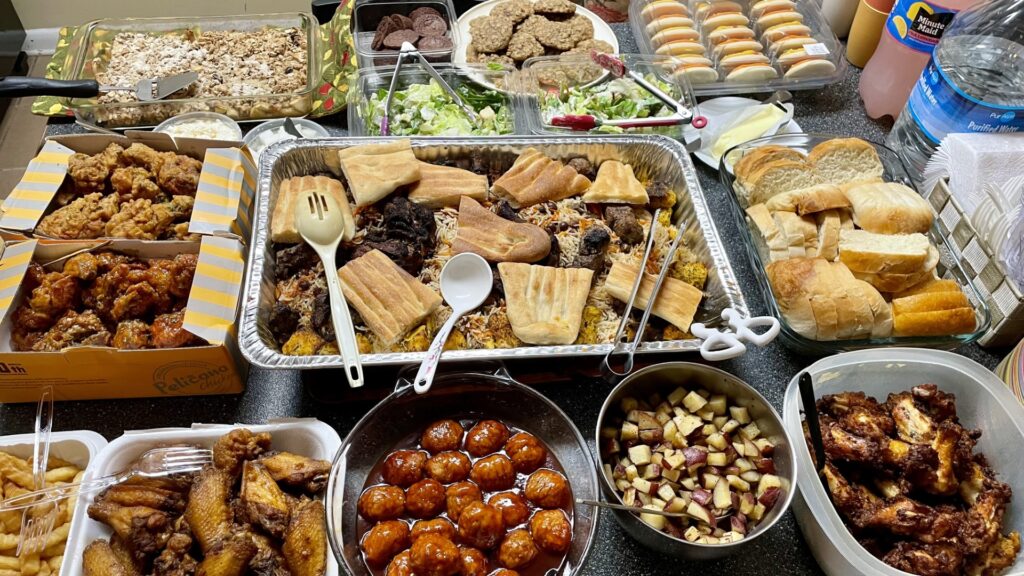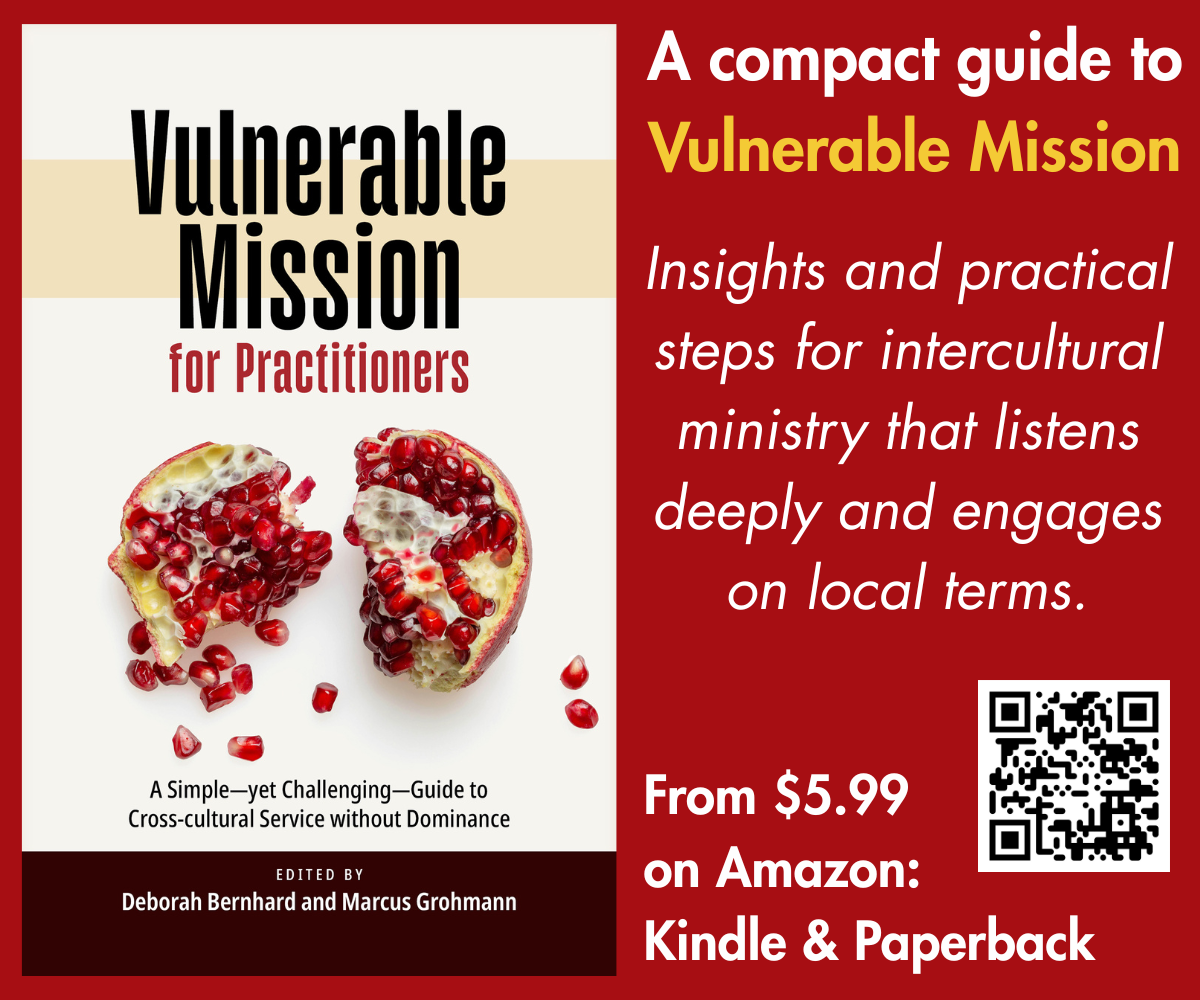EMQ » Jan – March 2025 » Volume 61 Issue 1

Global Hospitality
Summary: The arts of hospitality and shared meals offer a warm welcome to a global community into the church while sustaining the relationships of those already following Christ. Yet to do this well requires intentionality.
By Jaewoo Kim
My family lives in Clarkston, Georgia, USA, where many immigrants and refugees from all over the world have resettled. As we’ve become friends with our neighbors and shared meals with them, we’ve learned more about the closely intertwined arts of hospitality and making meals that feed both the soul and stomach.
A friend from Syria, who resettled in our city, invited our family to his home. Recalling our past visits, we anticipated a table laden with an abundance of diverse Syrian dishes, far more than our family could possibly consume. Upon arrival, our expectations were met with a feast that could only be described in Korean as “Sang-da-ri-ga Bu-reo-jil-jung-do-ro: a table laden to the point of breaking.”
During our meal together, our friend taught us an Arabic expression: بيننا خبز وملح (baynana khubzun wa milhun). This translates literally to “between us, bread and salt.” It signifies a shared meal and a deeper bond, implying friendship and alliance forged through the essential elements of bread and salt.
In Korean, the word for family, 식구 (sikgu), literally means “mouths that eat together.” In the past, when extended families lived together in one household, sharing meals signified a community of fate, bound together not just by blood but by the necessity of survival. It implies a relationship of mutual reliance, support, and care that goes beyond simply sharing a meal.
Similarly, the English word companion originates from the Latin words com (with) and panis (bread), literally meaning “someone you share bread with.” This echoes the Korean concept of sikgu. Companionship implies a close relationship of shared time, experiences, and mutual support, much like the Korean understanding of family.
Fostering Deeper Bonds
Across cultures, sharing a meal signifies an act of trust, exposing vulnerability by partaking in food offered by another, and fostering deeper bonds through this shared experience.
In Acts 10, we witness Peter in Joppa welcoming Gentiles, sent by Cornelius, into his lodging: “Then Peter invited the men into the house to be his guests” (Acts 10:23 NIV). Later, when Peter visits Cornelius’s home, Cornelius invites him to stay for several days: “So he ordered that they be baptized in the name of Jesus Christ. Then they asked Peter to stay with them for a few days” (Acts 10:48 NIV).
Peter understood the gravity of sharing space and meals with Gentiles, as it was against Jewish law: “He said to them: ‘You are well aware that it is against our law for a Jew to associate with or visit a Gentile’” (Acts 10:28 NIV).
Yet, this transgression was necessary. I can’t help but imagine the unspoken significance of Acts 10:23 and Acts 10:48. Sharing a meal meant crossing a point of no return, signifying a relationship as profound as the Arabic expression بيننا خبز وملح (baynana khubzun wa milhun) – a bond forged through “bread and salt.”
Sharing Meals Across Cultures
The Triune God, existing in community, creates a community where those who once demonized each other, refusing even to speak, now share bread and meals through Jesus Christ. Our weekly home group includes local Americans, recent immigrants, refugees from around the world, and second-generation immigrants.
We begin our Saturday evening gatherings with a potluck dinner. Attendees come from diverse backgrounds, including Christian, Buddhist, and Muslim faiths. While we clearly identify as a Christian worship community centered on Christ, we welcome those who haven’t yet embraced the Christian faith. This diversity necessitates cultural sensitivity in our shared meals, and our family, accustomed to Korean Christian culture and cuisine, is learning much about hospitality through these experiences.
Sharing meals with people from diverse cultures has brought new considerations to light. Assumptions we once made when preparing meals for fellow Koreans no longer apply. As a Korean Christian, I have few dietary restrictions, but I’ve learned that those raised in Buddhist cultures may not share my enthusiasm for meat. Those from Hindu backgrounds might avoid beef, which I enjoy. And sadly, sharing our beloved samgyeopsal (pork belly barbecue) with those from Muslim backgrounds is off the table (along with kimchi fried rice with Spam)!
Here are some things we consider when preparing our weekly potluck menu:
- Eat Mor Chikin (Pun intended): When serving meat dishes, we opt for chicken as it tends to be more widely accepted across cultures compared to beef, pork, or other meats.
- Offer meatless options: When we make Korean dishes like bibimbap (mixed rice with vegetables and meat) or japchae (glass noodles with vegetables and meat), we provide separate versions without meat.
- Consider dairy restrictions: Many cultures have higher rates of lactose intolerance compared to the US or the West. We keep this in mind when serving dishes with cheese.
- Be mindful of allergies: Coming from a collectivist culture, I was unaware of the prevalence of various food allergies until coming to the US. We make a conscious effort to remember this when using nuts, soy, eggs, and other potential allergens.
- Accommodate gluten-free needs: Creating gluten-free options requires knowledge, effort, and intentionality. We try to ensure they are available, either through other potluck contributions or by making a conscious effort to provide them ourselves.
- Adjust spice and temperature: Not everyone is accustomed to spicy and hot food. To accommodate diverse palates, we need to be mindful of spice levels and food temperatures.
- Communicate before serving: Before sharing food, we encourage communication about dietary restrictions and preferences. This helps prevent accidental consumption of restricted ingredients and avoids any offense or discomfort.
Other considerations:
- Seating: Some prefer sitting on the floor, others at tables with chairs, and some on the floor with a low table for food. We offer all three options.
- Utensils: We provide forks, spoons, and chopsticks to accommodate those who prefer eating with their hands, forks, or chopsticks.
- Portion control: We encourage taking only what one can eat to avoid food waste and ensure everyone has enough.
- Handling food: Some prefer picking up food with their hands, while others consider it inappropriate to touch food meant for others. We facilitate conversations about these cultural differences and encourage mutual respect.
- Environmental impact: We use reusable plates and cups, despite the added dishwashing effort, to minimize environmental impact. However, this might not be feasible in areas with water scarcity.
Communal Meals as Part of Worship
The global nature of the church, requiring such cultural considerations for shared meals, is a relatively recent phenomenon in church history. However, even the early church faced challenges in communal dining. In Galatians, Paul rebukes Peter for withdrawing from eating with Gentiles (Galatians 2:11 – 14). He also addresses issues arising during communal meals in the Corinthian church (1 Corinthians 11).
Unless everyone comes from the same socio-economic background, communities will have diverse financial situations. Some may be unable to contribute food due to time constraints or financial limitations. We prepare extra food to accommodate this.
In 1 Corinthians 11, which reflects the early church, it seems there was inequality and unfairness during communal meals, with some eating early and others arriving late to find little left. Paul strongly condemns those who, disregarding socio-economic differences and the needs of others, indulged themselves first. He calls them “unworthy” of partaking in the Lord’s Supper (1 Corinthians 11:27) and warns against “eating and drinking without discerning the body’ (1 Corinthians 11:29). For the early church, just and peaceful communal meals were crucial for authentic worship.
Being Good Hosts and Guests
Sharing meals across cultures is a complex act laden with meaning, requiring learning, adaptation, and overcoming challenges. Yet, it’s also one of the most intimate and meaningful expressions of human connection.
Jesus Christ was a gracious host to Peter (John 21:9), and in Revelation 3:20, he knocks on our door, seeking to dine with us. Like Christ, we can and should strive to be good hosts and guests. This involves hosting and being hosted by people from diverse backgrounds.
The resurrected Jesus dined with his disciples. His choice of company was selective but not discriminatory. Following his example, who will we choose to share our meals with?
“He was not seen by all the people, but by witnesses whom God had already chosen – by us who ate and drank with him after he rose from the dead” (Acts 10:4, emphasis added).

Jaewoo Kim (Jaewoo@proskuneo.org) leads ministry development and is the director of networking for Proskuneo Ministries in Clarkston, Georgia. Jaewoo loves connecting people and worshiping communities locally and globally to spark friendship and partnership. He is passionate about cultivating culturally diverse communities of Jesus worshippers. He is the author of Willingly Uncomfortable Worship and works with the Korean diaspora and other diasporic communities around the world.
EMQ, Volume 61, Issue 1. Copyright © 2025 by Missio Nexus. All rights reserved. Not to be reproduced or copied in any form without written permission from Missio Nexus. Email: EMQ@MissioNexus.org.







Responses